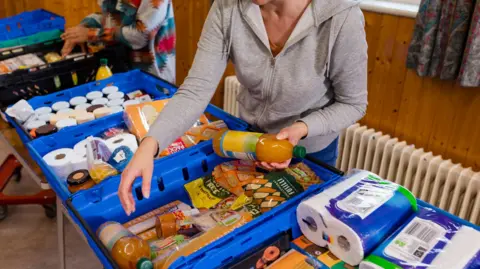The recent report highlighting the increasing demand for food banks across London has raised significant alarm among community organizations and food providers. Conducted by the Felix Project, a charity dedicated to redistributing surplus food, the survey has revealed that approximately one in five food bank operators in the capital anticipate a surge in demand that could double within the next year. This information comes from a comprehensive survey involving 614 community organizations, the results of which underline the pressing economic struggles faced by many households in London today.
The data reveal a staggering trend of escalating food bank usage, with nearly 85% of service providers reporting a rise in demand compared to last year. Alarmingly, almost half of these organizations confirmed that they are seeing a growing number of first-time users accessing their services. The implications of this trend are grim, as it points to an increasing number of individuals and families who, for the first time, find themselves in a position where they need external assistance for basic necessities such as food.
Charlotte Hill, the Chief Executive of the Felix Project, has expressed deep concern over what she refers to as the “devastating effect” the current cost-of-living crisis is having on people’s lives. Families struggling to make ends meet due to rising expenses are feeling the strain more than ever, with escalating costs for essentials such as housing, utilities, and food contributing to a precarious financial situation.
The Felix Project, which supports about 1,200 organizations and schools throughout London, highlighted that nearly 40% of these supported services are overly anxious about their ability to meet the impending increase in demand. This nervousness stems from a larger economic environment where many individuals are unable to cover their basic living costs, leading them to seek food assistance. Hill pointed out that the survey was conducted prior to what is referred to as “awful April,” a period marked by substantial hikes in council tax, as well as increases in energy, water, and broadband bills. This additional strain will undoubtedly compound the difficulties faced by families trying to balance their budgets.
Additionally, the survey found that 87% of organizations providing food assistance are engaged in offering a wide array of services beyond just food distribution. Many organizations, including Dads House in Hammersmith and Fulham, provide vital services such as debt advice, mental health support, and community activities ranging from yoga to sports. Dads House operates a four-day-a-week food bank and provides meals through a weekly lunch club, showcasing the multifaceted role such organizations play in their community.
William McGranaghan, the founder of Dads House, emphasized the importance of accessibility, noting the increasing number of new individuals seeking help each week. He lamented the ongoing issue of insufficient wages, which keep too many individuals and families trapped in financial hardship. With no relief in sight, these households have nowhere else to turn but food banks like his.
Overall, the growing reliance on food banks in London serves as a stark reminder of the precarious nature of many residents’ circumstances. As we continue to monitor the impact of economic factors and community responses, it is clear that organizations working on the ground will play a crucial role in supporting vulnerable populations during these challenging times. The ramifications of the ongoing cost-of-living crisis and its effects on food security underscore an urgent need for systemic change and increased support for food banks, ensuring that no one in London goes hungry.



